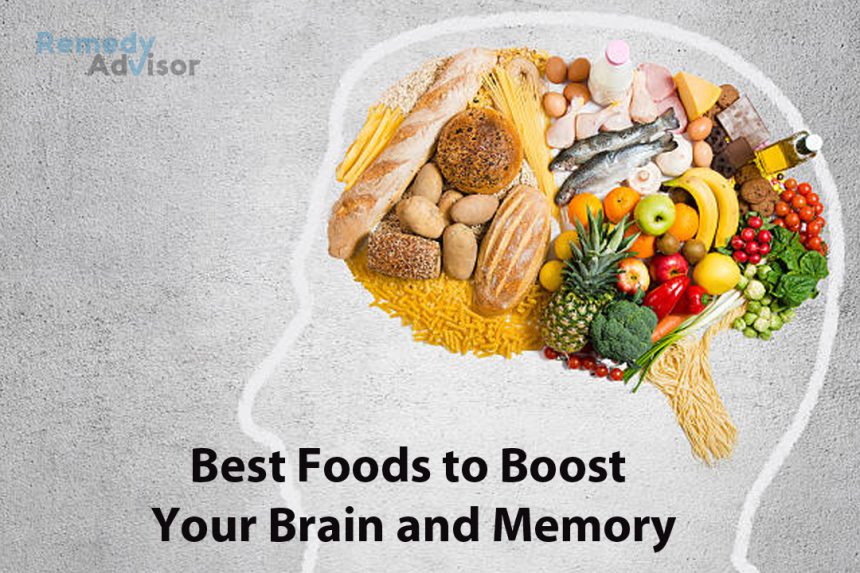Look, up in the sky!
It’s a flying frontal lobe!
No! It’s a mighty medulla oblongata!
No! It’s Super brain!
Super brain! Faster than a speeding algebra problem… more powerful than a dual disk drive… able to leap tall mental obstacles at a single bound! And who, disguised as Clark Cranium, fights a never-ending battle for Truth, Justice and the Intellectual Way!
Now don’t turn that page, folks. Stay right here and you too can learn how to become another Super brain just like your favorite comic-book hero.
It’s simple, it’s easy and because, as the old saying goes, you are what you eat, it’s healthy, too! That’s right, you can improve your mind become more alert, even increase your memory all by knowing the correct foods to eat.
Mood food
If we are what we eat, it is then safe to say that we also think what we eat, for as studies now show, our diet affects the way our mind operates.
Think of it this way. The next time you skip lunch and gobble down a candy bar instead, you’re sending sugar, fats and a whole assortment of unnatural ingredients through your bloodstream. It might work in giving you a quick (but short-lived) jolt of physical energy, but when it comes to mental energy, it’s a lot like pouring water into an empty automobile gas tank. It’ll fill the tank, but the car’s still not going anywhere.
On the other hand, says noted nutrition researcher Judith Wurtman, Ph.D., of the Massachusetts Institute of ‘Technology, if your diet consists of fresh foods, especially those high in protein, you’re supplying your body with the proper amino acids, which will produce the chemicals needed to stimulate your brain, keeping it energized and alert.
Simply stated, if you want to be smart you have to eat smart.
Brain drain
When we eat carbohydrate-laden foods with little or no protein, our bodies produce a chemical known as serotonin, referred to as the calming chemical, explains Dr. Wurtman, author of Managing Your Mind and Mood through Food. When serotonin increases in the brain, we become emotionally relaxed, calm, and even a bit drowsy, especially late in the day. Some people actually react by feeling sluggish and dull, especially if they have not eaten any protein for a long time.
That may be fine if your day happens to revolve around lying in bed, watching television and eating bowls of potato salad. But a carbohydrate-induced feeling of mental drowsiness may not be the best idea if you happen to be spending the day at work, interviewing for a job, driving through heavy traffic, or planning to climb up on your roof to repair that wobbly TV antenna.
“Carbohydrates eaten straight release insulin into the bloodstream, causing amino acids in the blood to leave rapidly and enter muscles and other cells in the body,” says Dr. Wurtman. “One amino acid, tryptophan leaves more slowly and during that time can enter the brain to immediately manufacture serotonin. At this point you begin to relax.”
Don’t be a fathead
Make a mistake, do or say some- thing stupid and someone may call you a “fathead.” According to what Dr. Wurtman says, there may be good reason.
“During the long, drawn-out digestive process that follows a high- fat meal, relatively more blood is diverted to the stomach and intestines and away from the brain,” she explains. “Mental processes are slowed, the mind is dulled, and the result is soppy thinking . . . or no thinking at all.
“Foods high in fats can have a disastrous effect on your ability to concentrate. If at any point during the day you need to think clearly, you’d better stock up your body with proteins; otherwise you’ll find yourself feeling mentally slow, using poor mental judgment and becoming easily distracted.”
Brain gain
Whenever you eat protein, more of the amino acid tyrosine will enter your brain. Tyrosine is converted by the body into dopamine and norepinephrine, also known as the alertness chemicals.
“When the brain is receiving the alertness chemicals, people begin to think more quickly, react rapidly to stimuli and feel more attentive,” says Dr. Wurtman. “Their minds feel more motivated, alive and energized.”
Dr. Wurtman refers to this as being on a mental roll. “Problems, even big ones, often seem more manageable because of the heightened brainpower brought on by eating foods high in protein.”
The brainpower menu
Foods containing very little fat, almost no carbohydrates and very high protein are best bets to keep your mind energized and alert, says Dr. Wurtman. These foods are shellfish, fish, chicken (without the skin), veal and very lean beef (meaning all the fat is trimmed away).
Some low-fat, high-protein dairy products are also good for keeping the brain powered. Although vegetable protein sources are often high in carbohydrates and low in fat, they are not particularly good sources of high quality protein.
Many foods are high in both protein and fat and should be avoided when trying to keep your brain alert. Lamb, pork and pork products, liver, hard cheeses, whole milk and regular yogurt will slow the mind down.
Breakfast in bed
If you start your day by eating a high-fat, high-carbohydrate breakfast, like sausage and pancakes, you may as well order it in bed and plan on staying there the rest of the day. Your brain will be sluggish and unable to concentrate, says Dr. Wurtman.
Eat some protein in the morning, such as eggs, low-fat yogurt, cottage cheese or a slice of wheat toast topped with low-fat cheese, to keep your brain energy at pace with your body during the first part of the day. Carbohydrates will be useful for the latter part of the day when you want to unwind, decrease stress and relax. So after work, try eating some pasta or other high carbohydrate foods for dinner.







